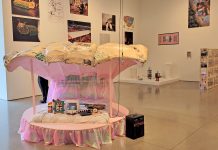
By Simone Goldstone | NB Indy Soundcheck Columnist
During my visit to our nation’s capital in December, I ducked into a dinner club where legendary singer-songwriter Gordon Lightfoot, whose hits “If You Could Read My Mind” and “Early Morning Rain” put Canada on the map during the early 1960’s folk revival and made their rightful way into the repertoires of Peter, Paul, and Mary, and even Elvis Presley, was about to take the stage.
Lightfoot’s tour had been delayed nearly two years due to the pandemic. Hoping to hear the strums and sounds that brought the ideas of traveling, wayward melodies and the glittering glory of faraway lands snatched out sight but slights of luck, I eagerly awaiting Mr. Lightfoot to take the stage.
Amazon Prime had released a wonderful, informative documentary on Gordon’s career that launched him into the spotlight again. After near five-star reviews, the documentary propelled him to take to the road.
Appearing in a red velvet blazer, sharp on his gaunt frame, was the guitar master of woeful, wistful songs and fingerpicking tunes. Despite his age (83), he was friendly, present, and happy to be there. In pointed black Chelsea boots, he stood like Hank Williams and his southern icons. It was a display not seen in modern day artists, a stance and presence one must have lived through in those times to recreate.
His stage presence transcended his age, and on the back of his guitar was a smiley face sticker, a nice nod to his Canadian friendliness and days of 60s folk optimism. Starting with “Carefree Highway,” I knew instantly nothing, not age, not cover bands, not the passing of time, could take the mysticism and originality out of his tunes.
Lightfoot’s complex melodies, perfect notes, and dramatic lyrics will hold up through the decades just as old fairy tales and fabled stories do. While he strummed his acoustic guitar, he had a full backing band. And while his age made his presence seem fragile, his eyes were bright and young. Perhaps a little quitter, but still a gateway to old hobo history none of us are brave enough to live, but content enough to listen to.
“It’s surreal to be here, after we had to reschedule the tour,” Gordon says, “I like that word: surreal.”
He repeats the adjective, teasing but also giving us a glimpse into his imagination and songwriting. His whole repertoire is surreal. He writes about lives he’s never lived, such as gambling away train tickets to see loved ones in “Steel Rain Blues.”
He sings songs of a nomad’s land of chance with a pointed face, one of Canada’s exports of glory in his day. And while his movements are slower, straining to remember his complex words and stories, it’s still clear we’re in the presence of a legend, albeit a funny, relatable legend. Lightfoot interacts with his audience, joking and embracing the aging process, one of the last pioneers on the road of remembrance of old music.
The harrowing, historic ballads are broken up by “If You Could Read My Mind.” A personal song about heartbreak and marital complications is now a tale of semi self-redemption. During the original release, he pins blame on his wife, even though Lightfoot is the one who cheated, with his lyrics, “And if you read between the lines, you’ll know that I’m just trying to understand, the feelings that you lack.”
In the Amazon documentary, Lightfoot notes his regret in not taking responsibility for his actions and misdirecting blame in his lyrics. His determination to atone is reflected in his live rendition of the song, as he changes the words right in front of our eyes, to “the feeling that we lack.” It’s never too late to accept responsibility, even if you’re a world famous folksinger.
The concert continued with mystical chimes and train music accompanying legendary hobo journeys. His laments of Canadians vagabonds with worn down boots and visions of railway cars ring out in his thin but emotive voice. He sand “Home from the Forrest” and “Beautiful.” Then, making the most of the East Coast’s cold December, he sings “Song for a Winter Night.”
“The air is still in the silence of our room,” he quavers, painting a picture with his words, as his fingers pluck the guitar like a harp.
Taking a break from singing, he tells us of a story sailing from South Carolina into Annapolis, preparing the audience for his next hit, “The Wreck of the Edmund Fitzgerald.”
His next story involves his almost meeting Elvis after a show, though by the time he got backstage, Elvis’ manager told him, “I’m sorry, sir, but Elvis has left the building.” Laughing off his memories from generations ago, he ends with one of his most beloved folk songs, “Early Morning Rain.” When I had first heard this song, and learned to play it on the guitar, I had thought it had no author. I figured a song about a transient longing for a home had been written by some nameless nomad, and that the melody and lyrics were so otherworldly and so descriptive that they could only by written by a poor traveler who had experienced that himself, akin to Rimbaud’s “My Bohemian Life.”
I heard the Peter, Paul, and Mary version, figuring it was an old American folk song, with foggy history and no copywrite. It was a shock to learn it was indeed written in the 1960s and by a Canadian coffeehouse performer, and that it was not a wandering freight-hopping hobo tune.
There will never be another writer like Gordon Lightfoot. It’s not that technology has taken away these experiences, or that artists don’t watch the trains rumble into the westward bound rusty sunsets, or any of those cliches. It’s just that to write such empathetic, transportive, mystical music that transcends time and countries, space, and limits, to make you feel like a wander with no past, is rarer than gold.
And perhaps, that fact was known all along, cemented with the fact that Lightfoot’s newest album is indeed called “Gord’s Gold.”




